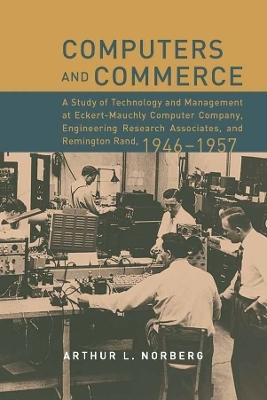
Computers and Commerce
A Study of Technology and Management at Eckert-Mauchly Computer Company, Engineering Research Associates, and Remington Rand, 1946-1957
Seiten
2005
MIT Press (Verlag)
978-0-262-14090-4 (ISBN)
MIT Press (Verlag)
978-0-262-14090-4 (ISBN)
- Keine Verlagsinformationen verfügbar
- Artikel merken
The history of a crucial decade in the early development of digital technology, focusing on both technical and business issues at two key firms.
Between 1946 and 1957 computing went from a preliminary, developmental stage to more widespread use accompanied by the beginnings of the digital computer industry. During this crucial decade, spurred by rapid technological advances, the computer enterprise became a major phenomenon. In Computers and Commerce, Arthur Norberg explores the importance of these years in the history of computing by focusing on technical developments and business strategies at two important firms, both established in 1946, Engineering Research Associates (ERA) and Eckert-Mauchly Computer Company (EMCC), from their early activities through their acquisition by Remington Rand. Both ERA and EMCC had their roots in World War II, and in postwar years both firms received major funding from the United States government. Norberg analyzes the interaction between the two companies and the government and examines the impact of this institutional context on technological innovation. He assesses the technical contributions of such key company figures as J. Presper Eckert, John Mauchly, Grace Hopper, and William Norris, analyzing the importance of engineering knowledge in converting theoretical designs into workable machines. Norberg looks at the two firms' operations after 1951 as independent subsidiaries of Remington Rand, and documents the management problems that began after Remington Rand merged with Sperry Gyroscope to form Sperry Rand in 1955.
Between 1946 and 1957 computing went from a preliminary, developmental stage to more widespread use accompanied by the beginnings of the digital computer industry. During this crucial decade, spurred by rapid technological advances, the computer enterprise became a major phenomenon. In Computers and Commerce, Arthur Norberg explores the importance of these years in the history of computing by focusing on technical developments and business strategies at two important firms, both established in 1946, Engineering Research Associates (ERA) and Eckert-Mauchly Computer Company (EMCC), from their early activities through their acquisition by Remington Rand. Both ERA and EMCC had their roots in World War II, and in postwar years both firms received major funding from the United States government. Norberg analyzes the interaction between the two companies and the government and examines the impact of this institutional context on technological innovation. He assesses the technical contributions of such key company figures as J. Presper Eckert, John Mauchly, Grace Hopper, and William Norris, analyzing the importance of engineering knowledge in converting theoretical designs into workable machines. Norberg looks at the two firms' operations after 1951 as independent subsidiaries of Remington Rand, and documents the management problems that began after Remington Rand merged with Sperry Gyroscope to form Sperry Rand in 1955.
Arthur L. Norberg is Director of the Charles Babbage Institute for the History of Information and Technology. He holds the ERA Land-Grant Chair in History of Technology and is a Professor in the Program in History of Science and Technology and in the Department of Computer Science at the University of Minnesota.
| Reihe/Serie | History of Computing |
|---|---|
| Zusatzinfo | 33 illus.; 33 Illustrations, unspecified |
| Verlagsort | Cambridge, Mass. |
| Sprache | englisch |
| Maße | 152 x 229 mm |
| Gewicht | 612 g |
| Themenwelt | Geschichte ► Teilgebiete der Geschichte ► Technikgeschichte |
| Mathematik / Informatik ► Informatik ► Theorie / Studium | |
| ISBN-10 | 0-262-14090-X / 026214090X |
| ISBN-13 | 978-0-262-14090-4 / 9780262140904 |
| Zustand | Neuware |
| Haben Sie eine Frage zum Produkt? |
Mehr entdecken
aus dem Bereich
aus dem Bereich
Buch | Softcover (2024)
Lehmanns Media (Verlag)
19,95 €
Vom Perceptron zum Deep Learning
Buch | Softcover (2022)
Springer Vieweg (Verlag)
19,99 €
Digitalisierung neu denken für eine gerechte Gesellschaft
Buch | Hardcover (2023)
Quadriga (Verlag)
20,00 €


